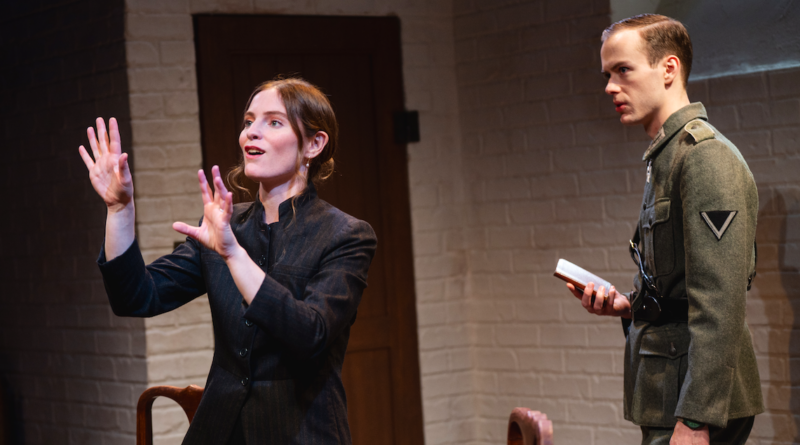INTERVIEW: Hannah Arendt faces questions in ‘Mrs. Stern’ play
Photo: Mrs. Stern Wanders the Prussian State Library stars, from left, Ella Dershowitz and Brett Temple. Photo courtesy of Valerie Terranova / Provided by DARR Publicity with permission.
Mrs. Stern Wanders the Prussian State Library, the acclaimed play by Jenny Lyn Bader, continues its extended run at WP Theater in New York City through Sunday, Jan. 19. The three-hander, produced by Luna Stage, is set in Berlin, circa 1933, according to press notes. The audience meets two people on opposite sides of the interrogation table: a young Gestapo officer enacting the martial law of the day and a graduate research (the real-life Hannah Arendt) whose tools of combat are thinking and philosophy.
Bader is a well-known writer whose previous credits include In Flight, Equally Divine and None of the Above, among others. She’s won playwrighting awards, according to her official biography, and she’s a graduate of Harvard University. This production of Mrs. Stern, directed by Ari Laura Kreith, has put her on the radar of New York theatergoing audiences who have kept this show alive and extending beyond its original run.
Recently Hollywood Soapbox exchanged emails with Bader about her new play and the success it has found in New York City. Questions and answers have been slightly edited for style.
What inspired you to put pen to paper and tell this story?
I had learned Hannah Arendt was arrested in 1933, but didn’t know the details. Then I read a transcript of a 1964 interview, where she spoke about that experience. She only described it briefly, but her description made me gasp. I felt there was a play there.
Did you have to conduct historical research on the time period and Hannah Arendt?
Yes, though sometimes I operate by instinct, writing first and researching later. But I ended up deeply immersed in researching both the time period and the person. The spring of 1933 in Berlin was a time of profound transition, with political circumstances and laws changing moment to moment, and it was a critical time in Arendt’s life. She was only 26 when she was arrested but already understood so much about what was happening and what was going to happen. She was the person who coined the term “totalitarianism.”
How much creative license do you use to tell the story?
I try to use not too much creative license, only the exact amount necessary. I fit the story within the parameters of what we know happened. What we don’t know I imagine, I fill in, but always within those parameters. Of course, occasionally I simplify something complicated or complexify something simple for the sake of more dynamic storytelling. Or tweak the timing. For instance, there’s a description of how the scholar Leo Strauss once made a pass at Hannah Arendt, and I mention that actual event. But I change when it occurs so I can have it witnessed by the secret police, and it can be mentioned in the interrogation.
What can this story teach audiences in 2025?
We’re in a time of transition again today. But this time, I think we know more a little more about how to keep things from going quite as disastrously as they did in the aftermath of 1933. This story has some insight about that. It teaches us how we can all do a better job listening to each other. It asks how we can have civil conversations with people, even people very different from ourselves — even those we might be inclined to stereotype or write off. It’s a story that offers some hope about finding our common humanity in these increasingly polarized times.
Have you been delighted by the critical response and extension?
Yes, I’ve been delighted by how much the play has been embraced by critics. Even more delightful is how many of the critics have grasped on a deep level what we are trying to do, and how many audience members have not only loved the play but returned to see it a second or third time. And after having a “limited engagement,” getting to add a few more weeks at another theatre — when I heard that was actually going to happen, I kept thinking, “And they say there are no second chances in life!” It has been magical.
What are some comments you hear from audience members as they leave?
What I love about the comments I hear after the show is they come from so many disparate people. We’ve had people on very different sides of the political spectrum say that it’s an important play that needs to be seen by more people. We’ve had audience members of different racial and religious backgrounds say that they felt invited into the Jewish story in a way they had not been before. And Jewish families of Holocaust survivors talk about how it connects to their experience.
We’ve had historians appreciate the little details, but people who’ve never heard of Arendt who now want to go read and find out more about her. One day a guy who taught literature at Yale compared it to [Tom] Stoppard, while the next day someone said that they usually hate plays of ideas but they love this play.
Usually people speak to their emotional experience first — about how the story was powerful, or moving. Sometimes when it ends they’re not ready to talk about it. But as they’re leaving the theatre I hear things like, “It’s so timely” or “It’s so timely it’s chilling” or — my favorite: “It gives me hope.”
By John Soltes / Publisher / John@HollywoodSoapbox.com
Mrs. Stern Wanders the Prussian State Library by Jenny Lyn Bader continues through Sunday, Jan. 19, at WP Theater in New York City. Click here for more information and tickets.

